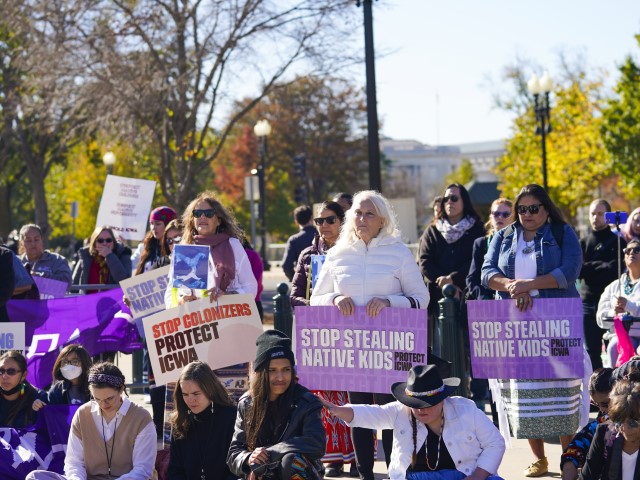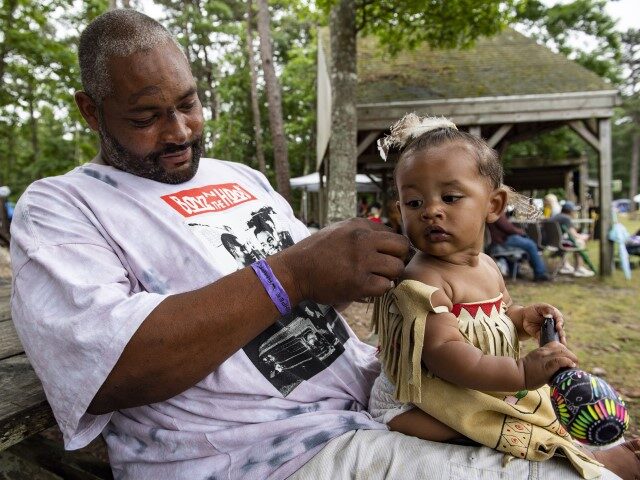WASHINGTON, DC – Federal law’s preference for placing American Indian children with Indian caretakers is consistent with the Constitution, a divided Supreme Court held on Thursday in a ponderous opinion covering several consolidated constitutional challenges to the Indian Child Welfare Act (ICWA).
“In the usual course, state courts apply state law when placing children in foster or adoptive homes. But when the child is an Indian, a federal statute—the Indian Child Welfare Act—governs,” Justice Amy Coney Barrett began for the court. “Among other things, this law requires a state court to place an Indian child with an Indian caretaker, if one is available. That is so even if the child is already living with a non-Indian family and the state court thinks it in the child’s best interest to stay there.”
“Congress found that many [Indian] children were being placed in non-Indian foster and adoptive homes and institutions,” she continued for the 7-2 majority, “and that the States had contributed to the problem by failing to recognize the essential tribal relations of Indian people and the cultural and social standards prevailing in Indian communities and families.”
“This harmed not only Indian parents and children, but also Indian tribes,” Barrett explained. “As Congress put it, there is no resource that is more vital to the continued existence and integrity of Indian tribes than their children.”
“We begin with petitioners’ claim that ICWA exceeds Congress’s power under Article I [of the Constitution],” the opinion said. “In a long line of cases, we have characterized Congress’s power to legislate with respect to the Indian tribes as plenary and exclusive.”
“The Indian Commerce Clause authorizes Congress ‘to regulate Commerce . . . with the Indian Tribes.’ We have interpreted the Indian Commerce Clause to reach not only trade, but certain ‘Indian affairs’ too,” Barrett noted.
Barrett wrote that the Treaty Clause, the inherent structure of the Constitution, and a line of Supreme Court precedent about a trust relationship between Congress and “the Indian people” all imply authority to pass the ICWA.
“In sum, Congress’s power to legislate with respect to Indians is well established and broad,” the court reasoned. “Consistent with that breadth, we have not doubted Congress’s ability to legislate across a wide range of areas, including criminal law, domestic violence, employment, property, tax, and trade.”
“Still, we have never wavered in our insistence that Congress’s Indian affairs power is not absolute,” it admitted, acknowledging that “domestic relations have traditionally been governed by state law,” and “that Congress lacks a general power over domestic relations.”

Demonstrators stand outside of the U.S. Supreme Court as the court hears arguments over the Indian Child Welfare Act, Wednesday, Nov. 9, 2022, in Washington. (AP Photo/Mariam Zuhaib)
Barrett concluded that Congress has authority to legislate in that area, writing:
We recognize that our case law puts petitioners in a difficult spot. We have often sustained Indian legislation without specifying the source of Congress’s power, and we have insisted that Congress’s power has limits without saying what they are. Yet petitioners’ strategy for dealing with the confusion is not to offer a theory for rationalizing this body of law—that would at least give us something to work with. Instead, they frame their arguments as if the slate were clean. More than two centuries in, it is anything but.
“Legislation that applies evenhandedly to state and private actors does not typically implicate the Tenth Amendment,” the opinion continued, turning to a Tenth Amendment argument that the federal government was violating state sovereignty. “When a federal statute applies on its face to both private and state actors, a commandeering argument is a heavy lift—and petitioners have not pulled it off.”
The majority declined to reach the merits of the remaining constitutional challenges in the case, explaining:
Petitioners raise two additional claims: an equal protection challenge to ICWA’s placement preferences and a nondelegation challenge to the provision allowing tribes to alter the placement preferences. We do not reach the merits of these claims because no party before the Court has standing to raise them. Article III requires a plaintiff to show that she has suffered an injury in fact that is fairly traceable to the defendant’s allegedly unlawful conduct and likely to be redressed by the requested relief. Neither the individual petitioners nor Texas can pass that test.
Justice Neil Gorsuch – joined in part by the two most liberal justices on the court, Sonia Sotomayor and Ketanji Brown Jackson – wrote a concurring opinion emphasizing the rights of Indians against state governments.
Justice Brett Kavanaugh wrote a concurring opinion, joining Barrett’s opinion in full but also signaling that he believed it is very possible that the ICWA violates equal protection, so he might vote differently if a plaintiff with standing to bring that claim makes it to the Supreme Court.
Justice Clarence Thomas dissented with a massive 40-page opinion of his own, which concluded:
The Constitution confers enumerated powers on the Federal Government. Not one of them supports ICWA. Nor does precedent. To the contrary, this Court has never upheld a federal statute that regulates the noncommercial activities of a U.S. citizen residing on lands under the sole jurisdiction of States merely because he happens to be an Indian. But that is exactly what ICWA does: It regulates child custody proceedings, brought in state courts, for those who need never have set foot on Indian lands. It is not about tribal lands or tribal governments, commerce, treaties, or federal property. It therefore fails equally under the Court’s precedents as it fails under the plain text and original meaning of the Constitution.
If there is one saving grace to today’s decision, it is that the majority holds only that Texas has failed to demonstrate that ICWA is unconstitutional. It declines to disturb the Fifth Circuit’s conclusion that ICWA is consistent with Article I, but without deciding that ICWA is, in fact, consistent with Article I. But, given ICWA’s patent intrusion into the normal domain of state government and clear departure from the Federal Government’s enumerated powers, I would hold that Congress lacked any authority to enact ICWA.
Justice Samuel Alito also dissented, writing separately to explain:
I am sympathetic to the challenges that tribes face in maintaining membership and preserving their cultures. And I do not question the idea that the best interests of children may in some circumstances take into account a desire to enable children to maintain a connection with the culture of their ancestors. The Constitution provides Congress with many means for promoting such interests. But the Constitution does not permit Congress to displace long-exercised state authority over child custody proceedings to advance those interests at the expense of vulnerable children and their families.
The cases are Haaland v. Brackeen, Nos. 21-376, -377, -378, and -380 in the Supreme Court of the United States.
Breitbart News senior legal contributor Ken Klukowski is a lawyer who served in the White House and Justice Department.

COMMENTS
Please let us know if you're having issues with commenting.